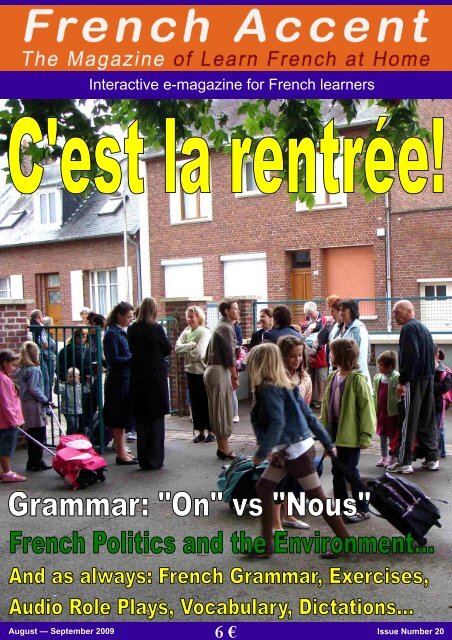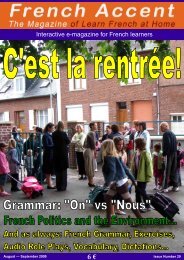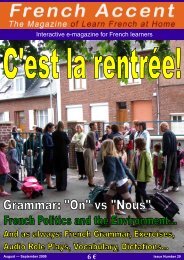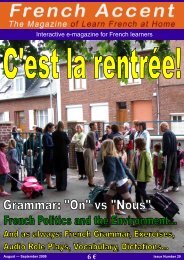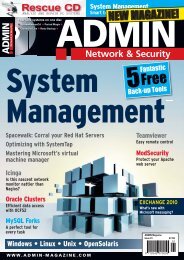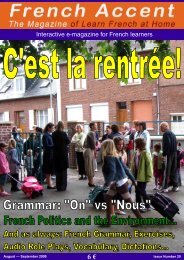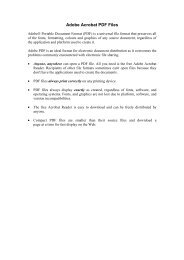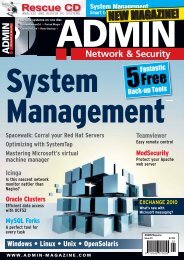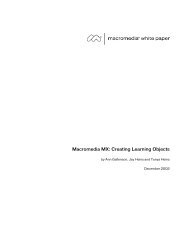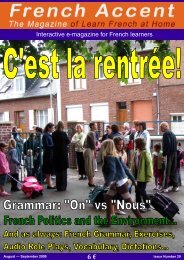You also want an ePaper? Increase the reach of your titles
YUMPU automatically turns print PDFs into web optimized ePapers that Google loves.
Interactive e-magazine for French learners<br />
August — September 2009<br />
6 €<br />
Issue Number 20
Page 2 French Accent, August-September 2009 Issue Number 20<br />
Éditorial<br />
“C’est la rentrée !” At the end of August, foreigners living in France will hear that expression<br />
so often that we thought it useful to offer a brief explanation of what the French mean<br />
by it, and how important it is for them. It is so important that the rentrée de septembre,<br />
which means the resumption of all activity after the long summer break, is very comparable<br />
to January 1 st as the first day of a new year, or of a new era. Even for those French<br />
who haven’t taken a real vacation because of la crise, this summer hiatus was felt to be a<br />
necessary pause, at least for the brain, and la rentrée will unleash the same reactions as it<br />
does every year. A sense of anger when they realize what the Sarkozy administration has<br />
prepared for them, for example within its environment programmes, as we explain in our<br />
article on Politics in France. A taste of bitterness at the idea of going back to work,<br />
school, or unemployment. A lingering fear when faced with a future of uncertainty. All of<br />
this might very well lead to a set of strikes, a national sport that the French are so good at<br />
it!<br />
But, at the same time, la rentrée also triggers a taste of something much more positive: the<br />
real pleasure of seeing the country spring to life again, in particular in the areas of art, culture,<br />
TV and sports. This is part of the way the French tackle la rentrée, with a set of<br />
mixed feelings, one of them being this sense of a new beginning, or even a boost, no matter<br />
how differently it may occur or manifest itself from one person to another.<br />
To give to those of our readers who are looking to improve their French another type of<br />
boost, we have continued in this issue to provide in-depth analyses of several expressions,<br />
such as the difference between on and nous in everyday spoken language, or other trendy<br />
words which are very much tendance or improbables these days in France. And we also<br />
want to encourage them to discover the best of the French, and Belgian, culture, through a<br />
few suggestions of things to see, visit or read.<br />
La rentrée is a very interesting time of the year to observe these and many other aspects of<br />
French culture. Don’t miss out on the many ramifications of this phenomenon, which is an<br />
integral part of the French experience, with all of its sometimes very strange peculiarities.<br />
E-magazine, published every two months.<br />
Educational purposes. Printable.<br />
French Accent Magazine<br />
Subscriptions<br />
Editorial team: Céline and Vincent Anthonioz, Annick and Roger<br />
Stevenson.<br />
Copyright: Reprints of the articles are permitted only with full mention<br />
of the title, the date and the web site address.<br />
Contacts<br />
Questions to the editor: editor@frenchaccentmagazine.com<br />
Subscriptions: admin@frenchaccentmagazine.com<br />
Advertisement: ad@frenchaccentmagazine.com<br />
Tél.: +33 (0)870.46 .77.8<strong>1.</strong><br />
Web site: www.frenchaccentmagazine.com<br />
Photo de couverture : La rentrée des classes à l’école de Rumigny<br />
(Somme). © Mairie de Rumigny. www.rumigny.fr<br />
One issue (2 months): 6 €<br />
Three issues (6 months): 15 €<br />
Six issues (12 months): 28 €<br />
To subscribe: click HERE<br />
When you see this symbol:<br />
click on it to print<br />
a full column, pdf format,<br />
without colours or pictures.<br />
Printable<br />
version<br />
When you see this symbol:<br />
click on it to access the web page with the audio file<br />
To download all the audio files of the magazine:<br />
click HERE
Issue Number 20<br />
French Accent, August-September 2009<br />
Page 3<br />
Sommaire<br />
Le français interactif<br />
“On”, Friendler than “Nous” Page 4<br />
- Basic French Scenario Page 4<br />
- Deux exercices Page 5<br />
- Intermediate French Scenario Page 6<br />
Le coin des branchés : Quelques expressions courantes Page 7<br />
Deux dictées Page 7<br />
Media Wordplay: C’est tendance... Page 8<br />
Le français rend intelligent ! Page 8<br />
Mots croisés Page 9<br />
Vivre en France<br />
La rentrée Page 10<br />
-Version anglaise : “La rentrée”: the Autumn return to normal Page 11<br />
Scénario : Paris, au mois d’août Page 12<br />
Scénario : Retour au travail Page 13<br />
Le vocabulaire des mots en “re” Page 14<br />
La politique française<br />
Le Grenelle d’une nuit d’été Page 15<br />
-Version anglaise : A Midsummer Night’s Grenelle Page 17<br />
Improbable... Page 19<br />
Sur la scène française<br />
Une chanson à décoder : Rue des souvenirs,<br />
des Cowboys Fringants Page 20<br />
Nouveau en Belgique: le musée Magritte Page 22<br />
À la librairie<br />
La petite histoire : Les premières vacances Page 23<br />
Un texte littéraire : Le Petit Nicolas : La visite (3 e partie) Page 24<br />
Livres et DVD : Nos coups de cœur Page 25<br />
Un conte d’enfant : Y a une pie Page 27<br />
La recette de cuisine<br />
Gratin de pommes de terre au crabe Page 28
Page 4 French Accent, August-September 2009<br />
Issue Number 20<br />
Le français interactif —<br />
“On”: Friendlier than “Nous”<br />
Printable<br />
version<br />
T he tiny word on carries<br />
great importance in everyday<br />
spoken French. For<br />
Anglophones learning<br />
French, on is frequently<br />
misunderstood or ignored<br />
because many think that on<br />
only expresses its English<br />
equivalent of ‘one’, while<br />
many of those who under-<br />
stand that it’s also an alternative<br />
to using nous hesitate<br />
to use it because of the false<br />
belief that it’s more formal.<br />
To make matters worse,<br />
French grammar books seldom<br />
deal with this issue.<br />
In this article and the scenarios<br />
that follow, I would<br />
like to clarify the usage of<br />
on and to encourage you to<br />
use it as frequently as the<br />
French do.<br />
On, the personal pronoun<br />
expressing ‘We’:<br />
Contrary to what many<br />
French learners think, using<br />
on does not carry a formal<br />
or even pompous con-<br />
notation, as is sometimes<br />
the case with the English<br />
‘one’. In fact, it’s a very<br />
convivial word. If you say<br />
on préfère le thé que le<br />
café, you’re not actually<br />
saying “one prefers tea to<br />
coffee”, but you’re simply<br />
saying “we prefer tea to<br />
(Cont’d page 5)<br />
French Basic Scenario<br />
Julie et son mari sont en vacances chez des amis en<br />
Ardèche pendant deux semaines. Julie et Carine, la<br />
maitresse de maison, font un plan d’activités pour aujourd’hui.<br />
Julie : Aujourd’hui, on peut peut-être aller voir les Gorges<br />
de l’Ardèche. Tu aimes aller là-bas ?<br />
Carine : Avec mon mari et les enfants, on y est allés la<br />
semaine dernière. Et les grottes ? On a de belles grottes<br />
en Ardèche !<br />
Julie : Ah oui, pourquoi pas ? Il ne fait pas très beau aujourd’hui.<br />
On peut passer la journée dans les grottes !<br />
Carine : Oui, elles sont vraiment magnifiques. On pourra<br />
déjeuner dans un restaurant sur place. En fin d’aprèsmidi,<br />
on ira faire les courses pour le repas du soir.<br />
Julie : Qu’est-ce qu’on mange ce soir ?<br />
Carine : On pense faire un barbecue !<br />
Julie : Ah sympa ! On t’aidera. On achètera la bière…<br />
Carine : En général, ici, avec les barbecues, on boit du<br />
Rosé de Provence. Est-ce que vous l’aimez ?<br />
Julie : Mais bien sûr ! On aime tout, on n’est pas difficile<br />
et surtout, on ne veut pas changer vos habitudes!<br />
Carine : Oh, on peut faire différemment mais<br />
le petit rosé est un délice. On va parler avec les<br />
hommes et voir ce qu’ils pensent de notre<br />
plan ?<br />
Julie : On y va !<br />
Julie and her husband are on holiday at their<br />
friend’s place in Ardèche for 2 weeks. Julie and<br />
Carine, the hostess of the house, are planning the<br />
activities for today.<br />
Julie: Today, perhaps we can go see the Grand Canyon<br />
of Ardèche. Do you like going there?<br />
Carine: With my husband and the children, we went<br />
there last week. How about the caves? We have beautiful<br />
caves in Ardèche!<br />
Julie: Oh yes, why not? It’s not a very nice day out<br />
today. We can spend the day in the caves!<br />
Carine: Yes, they are really beautiful. We will be able<br />
to eat lunch in a restaurant on site. At the end of the<br />
afternoon, we will go food shopping for the evening<br />
meal.<br />
Julie: What are we eating this evening?<br />
Carine: We’re thinking of having a barbecue!<br />
Julie: Oh nice! We will help you. We will buy some<br />
beer…<br />
Carine: Generally, here, with barbecues, we drink<br />
Rosé de Provence. Do you like it?<br />
Julie: But of course! We like everything, we’re not<br />
fussy and especially, we don’t want to change your<br />
habits!<br />
Carine: Well, we can always do something<br />
different, but this rosé is a real treat. We’re<br />
going to speak with the men and see what<br />
they think about our plan?<br />
Julie: Let’s go!


